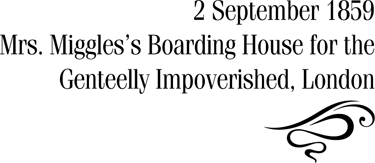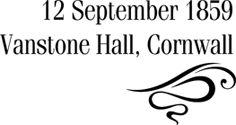There Will Be Phlogiston (30 page)
Read There Will Be Phlogiston Online
Authors: Riptide Publishing
Tags: #adventure, #action, #monster, #victorian, #steampunk, #multiple partners, #historical fantasy, #circus, #gaslight culture
I suppose I shall never know. I have gone through
his papers quite carefully, but most of them are deranged
scribblings and laundry lists. And since I am not to conveniently
inherit a fortune or, for that matter, a pot in which to perform an
intimate elimination, I must focus my attention on my future, or
lack thereof. I suppose I must apply to the agency for a new
position, but as I was unfortunately discharged from my last one
without a reference, I am not hopeful.
It really was the most wretched business. As I have
already written to you at length on this subject, I need not soil
this paper with my opinion of the Fitzhammonds, but you can surely
imagine my horror and outrage when I was called into Mr.
Fitzhammond’s study to answer (oh I can barely put it down, my pen
shakes so at the injustice of it all!) a charge of unnatural
advances to his eldest daughter. Maria is simply dreadful—a pot
roast in pink sarsenet, whose behaviour to me has grown
increasingly bold since she turned sixteen. Needless to say, I
would rather seek satisfaction with a broom handle than lay hand
upon her, and this was clearly her revenge. Her father harassed and
chided me for over an hour on the subject, and at last, pushed
beyond endurance by his impertinent inquisition, I told him I had
not seduced Maria and nor would I because she was deeply
ill-favoured. And then he ranted for some considerable time about
his little Maria being good enough to entertain the depraved lusts
of any right-thinking pervert, and fired me.
So, here I am again, back in London, friendless,
penniless, and jobless with blasphemous symbols swimming constantly
behind my eyes like the afterimage of suns. Ah well. How does that
saying go? When God closes a door, somebody opens a window and
dumps a chamber pot over your head.
I remain,
Your loving Jane

My dearest Miriam,
Thank you kindly for the description of the latest
additions to your wardrobe. Sheer black satin, you say, with wicked
little bows? How intriguing. Though you may have to tell me more
about it before I am able to render a sound sartorial opinion. I
look forward to your next missive.
As for myself, I cannot lie. Things have been
difficult of late. The investigation into the death of Uncle
Ridgewell was concluded, not to put too fine a point on it,
inconclusively, with a judgement in which the phrase “the balance
of his mind disturbed” featured prominently. And having gone
through his paperwork, I am inclined to agree. By the final pages,
the writing in his journal resembled nothing so much as the vile
scrawlings upon the idol pedestal: over and over and over again,
the most disturbing invocations to beings who slumber beyond the
stars. I must have spent too long in their perusal for the
hieroglyphics have lately taken on a peculiar clarity to me, as
though I learned them long ago.
However, putting aside these grotesque mysteries, I
do have some good tidings to share. After several fruitless
pilgrimages to the agency, where I was told in no uncertain terms
there was nothing suitable for me (emphasis theirs), I have at last
secured a new position with a family in Cornwall. The head of the
household is, I understand, a retired skycaptain, a widower, with
seven children. His wife passed away some years ago, and frankly, I
cannot blame her. Apparently they have had some trouble retaining
governesses in recent years, and I was asked for most
particularly.
Should this trouble me, I wonder? One hears such
stories. There was that red-haired girl hired at exorbitant expense
to impersonate the daughter of the household for reasons that still
strike me as manifestly implausible. Or the business with the
fellow with the black beard on the bicycle. Or our poor dear friend
from school who strangled that little boy in the woods one evening.
Of course, she always was terribly sensitive, and having attempted
to teach the rudiments of civilisation to little boys myself, I can
well understand why she might have succumbed to murderous
hysteria.
I did make some enquiries of the previous
governesses, but unfortunately none of them have answered my
letters. If I had any spare funds, I could hire a consulting
detective, but I do rather dislike consulting detectives, and my
finances are so deeply unhealthy as to be practically consumptive.
I shall simply have to be sensible. I will not ride any bicycles,
explore any attics, wander around any woods late at night, or
strangle any children. And if anyone should happen to want me to
wear any clothing other than my own, I will tell them no. How
difficult can it be? What can possibly go wrong? A skycaptain with
seven children. What is so fearsome about that?
But I must apologise for this hasty letter. I have
to make my preparations for the journey, and several challenging
decisions lie before me. For example, should I pack the grey
worsted or the grey nankeen? And will I need the grey organdie in
the wilds of Cornwall? Glamorous, is it not, the life of a
governess? Though, to tell the truth, I am not entirely without
hope. I understand the place is something of a smuggler’s haven. I
suppose I must take care lest I am set upon and brutally ravished
by a wild-eyed, wild-haired skypirate in tall boots and scarlet
petticoats. That would be simply dreadful. I had best take the
organdie.
Just in case.
I remain,
Your ever hopeful Jane

My dearest Miriam,
I am safely arrived, unravished, in Cornwall. I may
have to abandon all hopes in that direction. A would-be despoiler
would be hard pressed even to find me, for in this part of the
country, night sets in at two in the afternoon and does not depart
again until midway through the morning. The daylight, if so it may
be called, is a thin, pallid waif, who swoons and sighs and does
not linger long. If only the rest of us had such liberty. It began
to rain about twenty miles from Vanstone Hall and has not ceased
since. The sky shifts sullenly through shades of granite, and the
air possesses a uniquely clammy quality as though one breathes
through damp flannel.
In short, it’s charming here. Do visit.
Oh, I so envy you Italy. And your poor husband
recalled suddenly to India. Just in idle curiosity—I could stand to
hear a little more about the Venetian comtessa.
As for Vanstone Hall, it is your typical sprawling
English pile: golden stone and symmetry and terrible, terrible
draughts. The grey-green lawns stretch all the way to the sea,
which twists and turns beneath the clouds like an unquiet dreamer,
but otherwise we are surrounded on all sides by a dense black
forest which smothers what little light the sky bestows. The
captain himself spends the majority of his time in a decommissioned
airship, and the children, as a consequence, have been left to run
wild. The housekeeper, a black-clad gargoyle called Mrs. Smith,
took one look at me as I climbed, wind-buffeted and bedraggled from
the carriage, and declared that I would not last a day. If she
thought to menace me, she misjudged the matter severely, as I have
always rather appreciated being underestimated. It allows one to
relax.
While my meagre possessions were being taken up to
my room, Captain Vanstone honoured me with an introduction. He is a
tall, dark gentleman of the expected military bearing, not
unhandsome, I suppose (were one to be interested in that sort of
thing), if his features were not marred by the harshness of his
mouth and the coldness of his very blue eyes. We shook hands, and
he regarded me most intently, enquiring if I was indeed the niece
of Ridgewell Harris. I saw no reason to deny it, and he continued
to stare at me, as though some thought or recollection troubled
him, until Mrs. Smith cleared her throat, which seemed to recall
him to himself. Whereupon he produced a whistle from the pocket of
his coat, and sounded a naval call. In response, there was a mighty
clamour from the second floor, and his seven children came
galloping down the stairs and stood at attention in the entrance
hall.
My dear, I cannot tell you how deeply I was
impressed. In all my years of governessing, which admittedly do not
number so many, I do not know how such a marvellous idea had not
already occurred to me, for there is no task so demoralising or
exhausting as rounding up children. He had even prepared a whistle
for my use, and I thanked him with true sincerity for his kindness.
When he left us, I bade the children introduce themselves. The
eldest, Abigail, informed me she was sixteen and did not need a
governess, to which I responded that she had one and had therefore
better accustom herself to it for the sake of her own comfort. Next
came Benjamin, Chloe, and David, who said he was incorrigible, for
the previous governess had told him so. “Then I will see that you
are appropriately corridged,” said I. And, finally, Esther, Faith,
and Grace.
Once we had all met each other, I dismissed the
children to bed and went up to my room, for the hour was already
very late, and I was exhausted from my journey. In truth, I have
not slept well these past nights, for I have been beset by the same
unsettling dream: I am lost and alone amidst the measureless ruins
of an ancient city, its aether-smoothed, oddly angled stonework
thick with stardust and tarnished by untold centuries. And when I
look up, I see no familiar constellations, merely a great emptiness
through which the cold vastness of the universe seeps.
I remain,
Your somewhat troubled Jane

My dearest Miriam,
Thank you for your wise advice on how to induce a
peaceful slumber. I tried it diligently the other night, keeping
the image of my dear, kind friend clear in my mind, and I found it
most efficacious. I still dreamed of that ruined city, but I eased
more pleasantly into sleep.
We are settling into a routine here. I have
subjected the children to a week of Latin irregular verbs, which
has them nicely subdued, and I believe I am growing accustomed to
the savageries of the Cornish weather and the hostility of the land
that awaits me beyond the high iron gates that enclose our forest.
It is almost as though the moor has garbed itself to match the sky,
for it is little more than a blackened desert of stones, withered
heather, and storm-twisted trees. Conscious of my own strictures
not to wander foolishly about forbidding locales, I have been
obliged to largely restrict myself to the house, though even that
is not without its inconveniences, for it seems as though I cannot
take two steps in this dreary place without encountering Mrs.
Smith. I should wonder if she is following me, but she never has
anything to say to me, just dark looks to bestow and an irritating
facility for appearing without warning and vanishing into shadows
as though she were a part of them.
Honestly, it is beginning to take a toll on my
nerves.